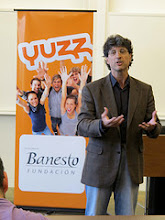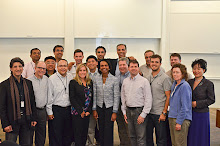Marvin Zonis is much more than a master or a friend: Marvin is a constant source of wisdom and inspiration, from the humility of probably the best expert in geopolitics in the Anglosaxon world.
Emeritus Professor at the University of Chicago, I had the privilege of having Marvin as a teacher in GSMP 2008, in some memorable classes with a lot of discussion and controversy, as usual when love and passion are in between.
He owns a farmhouse in Italy, in the región of Umbria, what says everything about his good tastes (well, Tuscany would be even better :)).
In his web MARVIN ZONIS.COM you will find all his data, publications, classes etc. and a way to suscribe to his newsletters: please find attached his last one.
The letter reports the doomy vision of the scholar Terence D. Murphy about Europe and its future.
Even though I am the Chief Optimistic Officer, it is my obligation to share this with you guys.
A LETTER ON THE EUROZONE
by Terence D. Murphy
Dear Marvin,
Ever since we started working together, since the second unification of Germany, I remained the optimist concerning Europe's economic and monetary union.
Recently, optimism has turned from doubt to dismay. Trained as a historian, I
argued that the second unification of Germany and the weight of history pushed Germany and France towards a closer union, that long-term economic and political trends fostered deeper European integration. And it worked for a
generation. Then came the unfolding. Lehman's Brothers bankruptcy spread
contagion. Europe became infected. The weak fell. Greece headed for default.
The pieces are still falling. And there's nobody in sight to pick them up. Not even the ECB.
This week's Economist has a bleak forecast for the eurozone. Unfortunately, I
don't think there's anything that can be done to stop the blaze. Save the
domestic banks and a few patriots, only the ECB is buying euro denominated
sovereign bonds. And the more the ECB buys, the more banks off-load their
holdings.
The tragic mistake was the Greek hair cut.
Rather than salvation for the Greeks, it was the beginning of the end for Italy. Rather than helping Greece, it infected the European Financial Stability Facility. The EFSF cannot even borrow the money that government's promise to back.
Could it be that the call for the recapitalization of banks re-enforces the message that the Greek haircut is the model for the future?
You're going to need more money, because the next haircut is going to Italy.
Should the lending strike continue, Italy will never be able to raise
the 30 billion needed by the end of January.
With the failure of the German auction, I think we have reached a point of no
return. And it seems as if the German central bankers are in total denial. Jens
Weidmann, Bundesbank President, believes the buyers' strike is a passing
phenomenon.
I believe his recent intervention before German industrialists resembles the affirmation of faith of a young man before his elders.
Very Protestant manifestation of a fundamental psychic flaw: affirm your faith, regardless of the consequences. Luther's : "On this, I take my stand" comes to mind.
Merkel's call for austerity and budgetary discipline, much like IMF
injunctions to debtors of the 90s, slows growth, increases the deficit and piles on more debt. A vicious cycle. Her call for a closer fiscal union requires changes in the Lisbon Treaty.
Perhaps even in the German Constitution. Again, her appeal to law and the sanctity of treaties is a perfect cover to explain the German veto over
the compromises proposed by the EU commission, France, et al.
I love her call for restraint at this moment of crisis. It's like a home-owner planting olive trees in the olives to munch on back garden as her home burns down.
Actually, that's a good image. Let the house (the European Union) burn, we (Germany) will build something more suitable (for Germany). In the end, we'll have a new and better house. And olives to munch on.
Terry
Terence Murphy is a Professor at The American University of Paris. He can be reached at murphyt@wanadoo.fr.








No hay comentarios:
Publicar un comentario